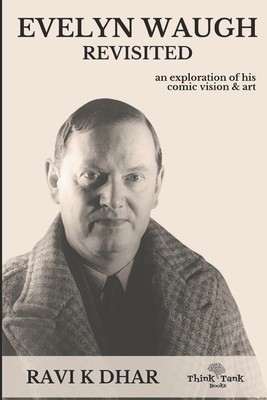
- We will send in 10–14 business days.
- Author: Ravi K Dhar
- Publisher: Think Tank Books
- ISBN-10: 8194756162
- ISBN-13: 9788194756163
- Format: 15.2 x 22.9 x 1.6 cm, softcover
- Language: English
- SAVE -10% with code: EXTRA
Reviews
Description
Born on 28 October 1903 to Arthur Waugh (1866-1943) and Catherine Charlotte Raban (1870-1954) Arthur Evelyn St. John Waugh (1903-1966), popularly known by his pen name Evelyn Waugh, wrote thirteen major novels apart from short stories, travelogues, essays, news stories and non-fiction. In the maze of his prolific writings, the quintessential Waugh often escaped the critical scrutiny of critics and reviewers, who often charged him with being a bitter critic of modern Britain, without presenting an alternative moral vision or else that his novels play up an untenable nostalgia for the aristocratic values of the feudal past and a pre-occupation with thrusting his religion on others.
This book attempts to tear through the foggy veil of such critiques to revisit and redeem the real Waugh as represented in his creative works. The study argues that the claim of Evelyn Waugh to be recognised as a major twentieth century novelist in English literature rests on his creative use of comedy to convey his unique vision of life. The book highlights the centrality of the ubiquitous metaphor of the ever-revolving wheel of life to an understanding of his comic vision and art. The metaphor helps to define not just the division of this world into static, dynamic and religious characters, but also the weltanschauung that drives them to lead their lives in a particular way. Based on this, Waugh's novels are amenable to classification into lesser and greater comedies. The book argues that while the lesser comedies play up the absurdity of belief in the Enlightenment philosophy of progress, the greater comedies present the grandeur of life in the spiritual resurrection of the central characters.
EXTRA 10 % discount with code: EXTRA
The promotion ends in 21d.00:17:16
The discount code is valid when purchasing from 10 €. Discounts do not stack.
- Author: Ravi K Dhar
- Publisher: Think Tank Books
- ISBN-10: 8194756162
- ISBN-13: 9788194756163
- Format: 15.2 x 22.9 x 1.6 cm, softcover
- Language: English English
Born on 28 October 1903 to Arthur Waugh (1866-1943) and Catherine Charlotte Raban (1870-1954) Arthur Evelyn St. John Waugh (1903-1966), popularly known by his pen name Evelyn Waugh, wrote thirteen major novels apart from short stories, travelogues, essays, news stories and non-fiction. In the maze of his prolific writings, the quintessential Waugh often escaped the critical scrutiny of critics and reviewers, who often charged him with being a bitter critic of modern Britain, without presenting an alternative moral vision or else that his novels play up an untenable nostalgia for the aristocratic values of the feudal past and a pre-occupation with thrusting his religion on others.
This book attempts to tear through the foggy veil of such critiques to revisit and redeem the real Waugh as represented in his creative works. The study argues that the claim of Evelyn Waugh to be recognised as a major twentieth century novelist in English literature rests on his creative use of comedy to convey his unique vision of life. The book highlights the centrality of the ubiquitous metaphor of the ever-revolving wheel of life to an understanding of his comic vision and art. The metaphor helps to define not just the division of this world into static, dynamic and religious characters, but also the weltanschauung that drives them to lead their lives in a particular way. Based on this, Waugh's novels are amenable to classification into lesser and greater comedies. The book argues that while the lesser comedies play up the absurdity of belief in the Enlightenment philosophy of progress, the greater comedies present the grandeur of life in the spiritual resurrection of the central characters.


Reviews